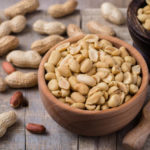Health Benefits of Eating Pear
Pear is an effective blood pressure controller and this is one of the benefits of eating pear.
There is archeological evidence regarding its dietary use over three thousand years ago.
As it is, ancient Greco-Roman botanical and medical writers knew its enormous nutritive and medicinal benefits quite well.
Apart from preventing hypertension, one of the benefits of eating pear is that it is quite diuretic and quite luscious even to more thirst-quenching than ice cream.
Pears are among the foods for the arteries.
When consumed at the peak of its ripeness, it falls among the sweetest and most succulent of fruits.
Before delving into the benefits of eating pear, let’s take a look at some of the features.

Other names:
French: Poire
Spanish: Pera
German: Birne
The fruit of the pear tree (‘Pyrus communis’ L.) is quite similar to the apple of the botanical family Rosaceae. Pears are grown or cultivated throughout temperate regions of the entire universe.
Properties of Pear
They are well known for their significant sugar content (12.7%) but quite lacking in proteins (about (0.39%) and even fat (0.4%).
In terms of their mineral content, the most abundant of all the minerals are potassium, magnesium and iron. There are also trace elements such as zinc, manganese and copper.
Pears contain vitamins but in small amounts, which are vitamins B C, and E. However, the vitamin and mineral content in pears are somewhat greater than those of apples.
It is noteworthy that pear’s vegetable fiber content is also one of the benefits of eating pear. Its vegetable fiber content is slightly less than the apple (2.4%) as compared to (2.7%) of apple.
In contrast, pears make available greater amount of insoluble fiber, quite rich in lignin. This is a component that makes wheat bran and wood hard.
Here’s nutritional value of Grains
In essence, soluble fiber is highly effective against cholesterol while on the other hand, insoluble fiber is a very much effective laxative.
When we discuss the non-nutritive components, pears only contain lower organic acids proportion than apple with also a greater proportion of tannins.
All these being responsible for the anti-inflammatory and absorbent effects are also some of the benefits of eating pear. Pears are diuretic as stated above and they also have mild astringent and refreshing properties.
Pear Composition
Energy = 59.0 kcal = 247 kj
Carbohydrate = 12.7 g
Protein = 0.390 g
Fiber = 2.40 g
Vitamin A = 2.00 µg RE
Vitamin B1 = 0.020 mg
Vitamin B2 = 0.040 mg
Niacin = 0.100 mg NE
Vitamin B6 = 0.018 mg
Folate = 7.30 µg
Vitamin B12 = ___
Vitamin C = 4.00 mg
Vitamin E = 0.500 mg α-TE
Calcium = 11.0 mg
Phosphorus = 11.0 mg
Magnesium = 6.00 mg
Potassium = 125 mg
Iron = 0.250 mg
Zinc = 0.120 mg
Total Fat = 0.400 g
Saturated Fat = 0.022 g
Cholesterol = ___
Sodium = ___
According to Dr. George Pamplona-Roger, (Encyclopedia of Foods and their healing properties), this is based on % daily value of (on a 2,000 calorie diet) provided by 100 grams of this food (pear).
Percentage Composition
Fiber = 2.40%
Carbohydrates = 12.7%
Fat = 0.400%
Protein = 0.390%
Mineral = 0.280%
Water = 83.8%
Indications to Benefits of Eating Pear
The following are some of the known medicinal indications. They include:
- Hypertension
- Obesity
- Excess uric acid
- Digestive disorders
- Renal failure
Hypertension

Since antiquity, one of the benefits of eating pear has been known to be capable of lowering blood pressure and this is where its diuretic effects come into action.
And today, it is known that this fruit has no sodium, which is one of the minerals that has the capacity to retain water within the body and fosters the increase of blood pressure.
Pear is quite rich in potassium, a mineral whose role is quite opposite to that of sodium. Again, studies have it that, the higher the potassium intake, the lower the risk of high blood pressure (hypertension).
Obesity
For its mild diuretic effect, it is recommended that pear be included in the weight loss diet of individuals who are suffering from obesity.
Depurative effect is also one of the main reasons it should be made a part of weight loss diet which proffers some of the benefits of eating pear.
Excess uric acid
Consumption of pear helps in promoting the elimination of uric acid and other nitrogenous substances via the urine. They have an efficient alkalizing effect on the blood.
This offers a benefit in detoxifying diets that are put in place to neutralize excess acid residues brought by a diet which has enormous meat in it.
Digestive disorders
When pear becomes tender, it means that it is ripe and tends to digest easily. This shows that within 90 minutes of consuming it, it must have been digested and has arrived in the large intestine.
Among the benefits of eating pear are its mild astringent action and other effects also work against putrefaction of the intestine and flatulence which may occur in cases of large intestine inflammation and intestinal dyspepsia.
Renal failure
Benefits of eating pear are quite massive and here’s another one. Pears help in stimulating renal function and therefore recommended in cases of renal failure due to nephrosis or nephritis.

Since, it contains no sodium and also low in proteins, it is an ideal source of potassium and this brings about diuretic effect which helps renal disorders.
In addition, it is recommended to consume pear in abundance especially, in cases of cardiac and even renal edema.
Other benefits of eating pear
- Pear facilitates gut health: This is because they are a good source of soluble and insoluble fiber that needed for digestive health. The fiber is good in maintaining bowel regularity. In essence, soluble fiber helps the good bacteria in the gut. They help in improving immunity.
- Pears inhabit plant compounds that are beneficial; as green pears contain lutein and zeaxanthin which help to keep the vision sharp.
Another compound called anthocyanins is linked with a lowered risk of heart disease.
- Pears have anti-inflammatory benefits because they are rich in flavonoid antioxidants which act to fight inflammation.
Again, flavonoid intake has linked to a lowered risk of diabetes and heart disease.
Pears are filled with vitamins and minerals such as vitamins C and K, copper and other essential trace elements that help to combat inflammation. According to wellandgood, they are a good source of antioxidants such as vitamin C
- They help boost heart health
- Associated with a reduced risk of diabetes, according to healthline
- They have anticancer effects
- Weight loss
Preparation and Use of Pear
- Raw: It can be eaten raw but it is good and important to chew them well. Be cautious in peeling off the “peel” because it is of high dietary value. They must be grown organically. Wash well before eating.
- Cooked: Most vitamins are destroyed in the process but cooked pears are quite digestible. Minerals and sugar content are always intact even after cooking.
- Compotes and jams

A graduate of Computer Science and Information Management Technology. Diploma – Caregiving, Certificates – Dementia and Diabetes Awareness and Management. A researcher, blogger, songwriter, singer and acoustic guitarist. Born in an environment where natural talents such as healing are imparted at our natural birth. This natural talents of healing is the result of our genetic inheritance and the training from family environment.












